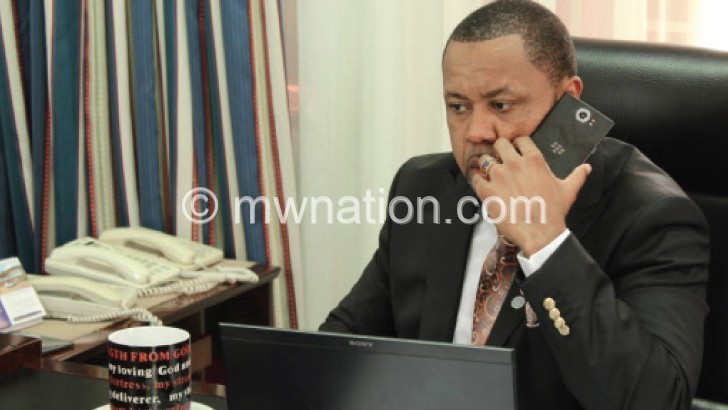Immunity scrap gains momentum
Barely days after Vice-President Saulos Chilima called for an amendment of a constitutional provision that shield a sitting President from criminal prosecution, a legislator is pushing for the removal of presidential immunity.
Chiradzulu North member of Parliament (MP) Willet Kalonga (independent) is set to table a Private Member’s Motion to amend Section 91(2) of the Constitution to remove the provision that gives a sitting President immunity.

Reads in part the motion: “…that this House resolves that a Constitutional [Amendment] Bill be brought into the House to amend Section 91(2) of the Constitution to allow for the investigation and prosecution of a President suspected to be corrupt.”
In an interview yesterday, Kalonga said if passed by Parliament, the motion would pave the way for the tabling of a constitutional amendment Bill to Section 91 (2) of the Constitution.
He said such a development would ensure accountability and sustenance of the constitutional principles that no one is above the law.
Said Kalonga: “There is no denying that there is corruption and we are all on one side to ensure that it is eradicated, including the President. It is in everyone’s interest that all of us should be held accountable.”
In an exclusive interview with The Nation on June 11 this year, Chilima, who is on record as having condemned appalling corruption levels in the government he serves, called for the amendment of the law on the basis that the provision is a licence for the presidency to engage in corrupt practices as the office bearers know they would not be prosecuted.
He was reacting to State House’s challenge in our sister newspaper Nation on Sunday of June 10 that the Vice-President should name and report to the Anti-Corruption Bureau (ACB) those he suspects are corrupt in President Peter Mutharika’s administration.
But some legal commentators have defended the provision, arguing that it is there to allow a sitting President govern without the cumbersome legal procedures and that it shields governance agencies such as the ACB from tight government control.
Danwood Chirwa, who teaches law at the University of Cape Town in South Africa, told The Nation in reaction to Chilima’s proposal: “It’s been difficult to prosecute former presidents in Malawi for corruption. Rarely too have ministers, who do not enjoy similar immunity, been prosecuted. Where they have been prosecuted, the investigation and prosecution were poorly conducted.
“At the core of the challenges is the lack of independence of the investigative and prosecutorial agencies and a corrupt political culture that reproduces itself.”
Remarking on the views of the legal commentators about the intentions of the framers of the Constitution, Kalonga said when a President is blatantly involved in corruption and fraud, it defeats the purpose of the presidency to uphold the rule of law.
He said the duty of the President to govern becomes disturbed when the President himself or herself engages in corrupt practices, principles that they swore to defend when elected.
“It does not set a good precedent because those who surround a sitting President carry out certain corrupt acts in the President’s name knowing fully well any criminal investigation that touches the President will not touch them. That should change,” said Kalonga.
The legislator appealed to MPs across the divide to support the motion for the sake of future generations and an effective political leadership.
Section 91 of the Constitution gives immunity from civil lawsuits and criminal charges to a person holding the office of President or performing the functions of President.
Section 91(2) reads: “No person holding the office of President shall be charged with any criminal offence in any court during his term of office.”
In an interview yesterday, Leader of the House Kondwani Nankhumwa confirmed that the Business Committee, which comprises the Speaker of the National Assembly and leaders of political parties in Parliament and sets out business to be discussed, met yesterday to consider new business, including such motions. But he said Kalonga’s motion was not discussed.
Instead, he said the committee approved for tabling a motion which MP for Nsanje West, Joseph Chidanti Malunga, plans to move on the age limit of an aspirant in the presidential election to be 65.
Currently, the law sets 35 as the minimum age for a presidential aspirant but is silent on the maximum age.





